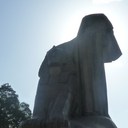
Social media’s role in the Egyptian revolution has been picked apart, but what do people in Egypt think about it? Meet Alyouka, the 21-year-old Egyptian who was the first person to Tweet out the #Jan25 hashtag which, along with #Egypt, became a rallying cry and loose way to organize communications around and about the protests. Twitter found Alyouka (no last name given) and asked her to write a post about her experience with social media on its hope140 blog.
“Twitter is a very important tool for protesters,” she writes. While she credits Facebook with being amore important organizing tool, Twitter was the communications tool of choice among a “certain class of activists . . . armed with smartphones.” She explains how the protesters used Twitter:
We use it to campaign and spread the word about protests/stands–hashtags are invaluable in that respect, and to share news quickly and efficiently, with our own 140-char commentary on them, and subsequently have conversations with random people/complete strangers. But most importantly, it allows us to share on the ground info like police brutality, things to watch out for, activists getting arrested, etc. A certain class of activists are armed with smartphones, which allow them to live-tweet the protests (for example, some people tweet the chants, because they’re often funny and interesting).
Watching hashtags such as #Jan25 and #Egypt become worldwide Twitter Trends also helped them gauge the support and visibility they were getting outside of Egypt. Alyouka also notes how the Egyptian authorities themselves were trying to use Twitter to spread propaganda and misinformation in a “painfully awkward” manner (the fake accounts are always easy to spot, aren’t they?). The tell-tale signs: always repeating the same Tweets, word-for-word, over different accounts about how bad the protests were for the country or praising Mubarak with few followers and very few tweets per account.
Finally, Alyouka confirms that the Tunisian protests a few weeks earlier offered inspiration to their Egyptian counterparts and gave them courage. “Tunisia showed us that a popular revolution can take place and topple a dictatorial regime, without the need for strong leadership and tight organisation,” she writes. So no, Twitter and Facebook did not cause this revolution, but they did help the young protesters organize themselves and communicate with one another.
http://twitter.com/#!/alya1989262/status/26353718601449472